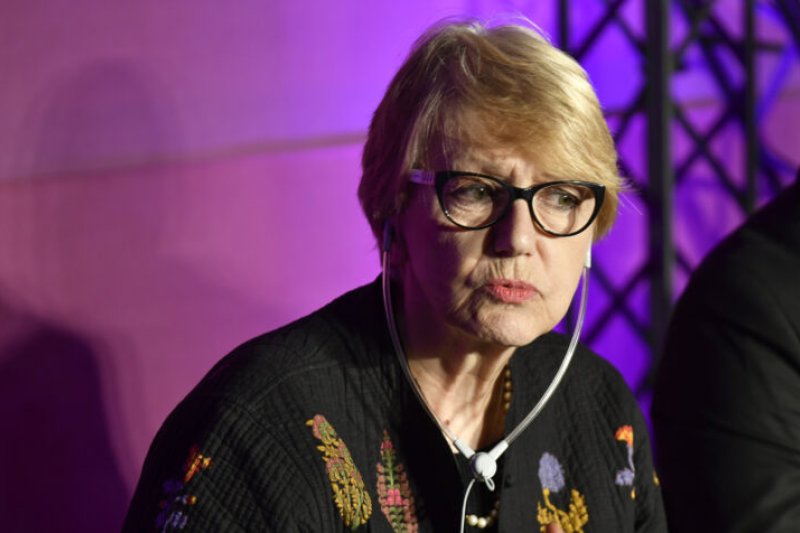Serbia Hasn’t Relinquished Partition of Kosovo
“The dialogue between Belgrade and Pristina is in crisis or at a standstill. The crisis escalated when the mayors from the Serbian List in northern Kosovo resigned at the end of 2022, just as Germany and France demanded "de facto recognition" from Belgrade”
“Belgrade has not relinquished the idea of partition of Kosovo, which remains its sole strategy, whether openly discussed or pursued covertly,” said founder and president of the Helsinki Committee for Human Rights (HCHR) in Serbia Sonja Biserko in an exclusive interview with Albanian Daily News.
Thus far, Belgrade has repeatedly made decisions that are contrary to the interests of Kosovo Serbs part of which is the non-participation of the Serbian List regarding voting on April 21 in North Kosovo, said Biserko. “All these actions are aimed at demonizing the Pristina government, especially in light of Kosovo's forthcoming membership in the Council of Europe,” she said.
According to Ms. Biserko, the visit of President Vucic to Paris was a real fiasco despite the praise from pro-Vucic media. “President Macron clearly communicated what is expected from Belgrade: prosecuting those responsible for Banjska, implementing the Ohrid Agreement, and guaranteeing the integrity of Bosnia. Two days after the visit, Macron made a very strong statement regarding the Srebrenica Resolution expected to be adopted at the end of this month. France has joined as a co-sponsor. He emphasized the necessity of aligning foreign policy with the EU, particularly regarding Russia.”
Asked about the strategy of the US and EU towards Belgrade President Biserko thinks that they believe that Serbia will choose EU membership and will respect all agreements in that regard. “Unfortunately, this is a mistaken assessment because Belgrade has not shown any indication of changing its policies so far, as evidenced by Vucic's media policy. Eighty percent of the public opinion supports Russia and believes that the West and NATO are responsible for the war in Ukraine. It seems that the US is most persistently pursuing this strategy.”
Ms. Biserko was of the opinion that the dialogue between Belgrade and Pristina is in crisis or at a standstill. “The crisis escalated when the mayors from the Serbian List in northern Kosovo resigned at the end of 2022, just as Germany and France demanded "de facto recognition" from Belgrade. The crisis continued when the Serbian List boycotted the new elections in 2023, creating a legal vacuum in northern Kosovo without local authorities. This has fueled the worst violence in the region in recent times, which is likely to continue. The culmination was certainly Banjska. The EU is changing its approach due to a very dynamic and dangerous constellation, which has brought security priorities to the forefront over democracy,” president of the HCHR in Serbia Sonja Biserko said in the following interview:
Albanian Daily News: The situation seems to have become more complex regarding the scheduled April 21 vote in North Kosovo after the Srpska Lista representatives submitted their resignations to the Central Election Commission. As a close follower of the events, Ms. Biserko, two questions: which is the scheme orchestrated in Belgrade and how will Kosovo authorities and internationals respond to such a crossroads?
HCHR President in Serbia Sonja Biserko: Belgrade unfortunately persists with its destructive policies regarding Kosovo. Thus far, it has repeatedly made decisions that are contrary to the interests of Kosovo Serbs. To illustrate, there have been exits from institutions, non-participation in elections, and now the Serbian List's decision regarding voting on April 21. All these actions are aimed at demonizing the Pristina government, especially in light of Kosovo's forthcoming membership in the Council of Europe. Belgrade has not relinquished the idea of partition, which remains its sole strategy, whether openly discussed or pursued covertly.
However, the international landscape has shifted, and President Vu?i? has lost the trust of the Western international community following the Banjska incident and electoral fraud in December. Mounting pressures from the West (and likely Russia) have resulted in the radicalization of his rhetoric and threats, indicating his unease. It's challenging to foresee Serbia's next steps, given its fundamental anti-liberal and anti-Western stance. Opening up and advancing such a society will require substantial patience and effort.
-Another significant development was the visit to Paris of Serb President Vucic where he met President Macron and among others a deal was reached to supply Serbia with super modern French jets. Which is your insight on the above development?
-The visit was a real fiasco despite the praise from pro-Vucic media. President Macron clearly communicated what is expected from Belgrade: prosecuting those responsible for Banjska, implementing the Ohrid Agreement, and guaranteeing the integrity of Bosnia. Two days after the visit, Macron made a very strong statement regarding the Srebrenica Resolution expected to be adopted at the end of this month. France has joined as a co-sponsor. He emphasized the necessity of aligning foreign policy with the EU, particularly regarding Russia.
As for the French jets, the deal is not yet finalized and will likely take another two to three years, if it happens at all. This will depend on further developments on the international scene.
Since the beginning of the war in Ukraine, there has been speculation about the possibility of a second front opening in the Western Balkans. In addition to Banjska, all of these speculations have intensified the engagement of the Western community in the Balkans to prevent any possibility of escalation. In this sense, the likelihood of conflict has decreased, but the world is walking on the edge, and a slip-up can occur at any point.
-Could it be said that Western Balkans is more stable and peaceful than before and which is the role of the Berlin Process Initiative and can we say that it is delivering?
-I expect that the renewed or revitalized Berlin Process will be more dynamic and lead to a more serious engagement by the EU in the Western Balkans. As it is known, a package of 6 billion euros for the Western Balkans has already been announced – of which 2 billion euros are for grants and the rest are favorable loans for reforms. It seems that the West is determined to address the Balkan issue with or without Serbia. The door is still open for Serbia's decision.
However, this offer of 6 billion euros is not sufficient because there has been a democratic regression in the region that requires genuine Western engagement to turn things around.
-What do you think of the strategy of the US and EU regarding Belgrade as the Ohrid Accords seem to have failed?
-I believe that the strategy of the US and EU rests on the belief that Belgrade will choose EU membership and will respect all agreements in that regard. Unfortunately, this is a mistaken assessment because Belgrade has not shown any indication of changing its policies so far, as evidenced by Vucic's media policy. Eighty percent of the public opinion supports Russia and believes that the West and NATO are responsible for the war in Ukraine. It seems that the US is most persistently pursuing this strategy.
-Allow me please to turn back in time to the high level US-Serb-Kosovo meeting at the White House and its accords. In your view what has happened with its results…?
-Kosovo has benefited. Israel recognized Kosovo 13 years after its declaration of independence. This is a significant success for Kosovo after Serbia convinced a number of countries to reconsider their recognition of Kosovo.
Additionally, Kosovo has opened embassies in Jerusalem. However, Serbia has not yet relocated its embassy to Jerusalem, as stipulated by the Washington Agreement.
-Ms. Biserko to conclude what do you think about the future of dialogue between Belgrade and Pristina?
-It can be said that the dialogue between Belgrade and Pristina is in crisis or at a standstill. The crisis escalated when the mayors from the Serbian List in northern Kosovo resigned at the end of 2022, just as Germany and France demanded "de facto recognition" from Belgrade. The crisis continued when the Serbian List boycotted the new elections in 2023, creating a legal vacuum in northern Kosovo without local authorities. This has fueled the worst violence in the region in recent times, which is likely to continue. The culmination was certainly Banjska.
The EU is changing its approach due to a very dynamic and dangerous constellation, which has brought security priorities to the forefront over democracy.














